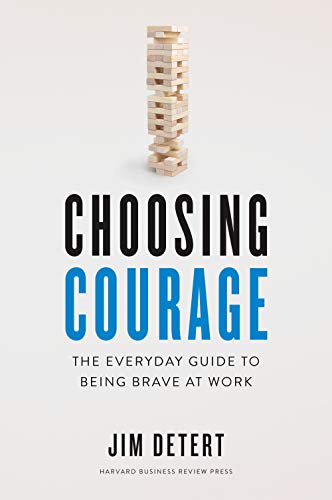I've always been comfortable with outward displays of audacity. I never had a problem hurling myself from an airplane while attached to a parachute, or diving off bridges into canyons with nothing but a bungee cord tied around my waist.
In my previous career as a journalist, I'd run toward the scene of terrorist attacks or fly into disaster zones, relishing the adrenaline buzz.
Yet I've often struggled with a different kind of bravery – the type that Jim Detert writes about in "Choosing Courage." The fortitude to "speak my truth," to risk confrontation, and to stand up to authority figures is something that eluded me for a long time. I've always found it hard to say things that I know are right but that might provoke anger or disapproval.
A Different Kind of Brave
Fortunately, thanks to many years of personal development, therapy, healing, and growth, I understand why I struggle to be my authentic self and why I'm afraid of people's anger. I now know that the fears that threaten to sabotage my present are rooted in my past.
And while I'll probably never enjoy "rocking the boat," I've learned to face my fears and speak up, even when there's a risk of negative repercussions.
But I can't do it on my own.
I need the support of others, as well as many of the tools and strategies Detert offers in this book. For example, I need to rehearse what I'm going to say – either to write it down or practice the conversation with someone else. I also need to choose my battles, pick my moment, adjust my message to my audience, and master my wayward emotions, as Detert advises.
The Courage Ladder
There's one practical tool in the book that I haven't tried, though, and would like to: Detert's Courage Ladder.
I like the idea of drawing a ladder and writing a list of actions next to each rung, ranking them in order of difficulty, and then gradually moving up the ladder, taking each action and noticing, as I go, that I grow in confidence and that things get easier.
I've known for a while now that uncomfortable actions lead to healing and growth. I've also learned – and this is something Detert also identifies – that when I procrastinate over doing something, which is often, my fear expands until everything feels overwhelming.
This is true of my work and my personal relationships, and it was especially true in my romantic life during my single years. Detert focuses on professional courage, but as I read the book, I couldn't help but notice how applicable his writing is to the area of "love," which is the field I now work in.
Love and Courage
It took me a long time to open myself up to love. I'd been hurt in the past and was afraid to get hurt again. And I don't just mean by previous partners. I'm referring to my very first experiences of love – with my parents, especially my dad.
I loved my dad and was devastated when my parents divorced and my dad left our family home. I didn't have the support or emotional maturity to process what was happening in a healthy way. Instead, I decided that love equaled loss, abandonment and pain. Why on earth would I want to do that again?
Many of my coaching clients have had similar experiences. Their childhood wounds have led to unhelpful belief systems and deep fears around love.
And what do we do when we have these fears? Just like in our professional lives, we avoid "frightening" situations. We stop dating. Or we date people who aren't available for love. Or we keep so busy at work that we don't have time for love.
And the more we avoid it, the more our fear grows, and the more difficult it is to engage with love again.
The Roots of Fear
The good news is that we can overcome our fears. Whether they're personal or professional fears, the key is to identify them, understand their roots, and then address them head-on, with a combination of self-mastery and external support.
I'm pleased to say that I managed to do this. I found love in midlife and I'm happily married. And I've found purpose in my struggles because I now support others in conquering their fears.
This is one of the things that motivates me to continue on my healing journey – the knowledge that every uncomfortable action I take inspires someone else to take an uncomfortable action. Then they, in turn, encourage someone else.
It's a virtuous circle. One that's well worth the discomfort we may feel when we do as Detert suggests – choose courage.
Download Our "Choosing Courage" Book Insight
Mind Tools reviews the best new business and self-development books, alongside the tested classics, in our monthly Book Insight for the Mind Tools Club. So, if you're a Club member or enterprise licensee, you can download or stream the full "Choosing Courage" Book Insight in text or audio format.
Meanwhile, what's your experience with fear and courage? Have you ever spoken up for something or someone at work? Join the discussion by adding your thoughts below!







